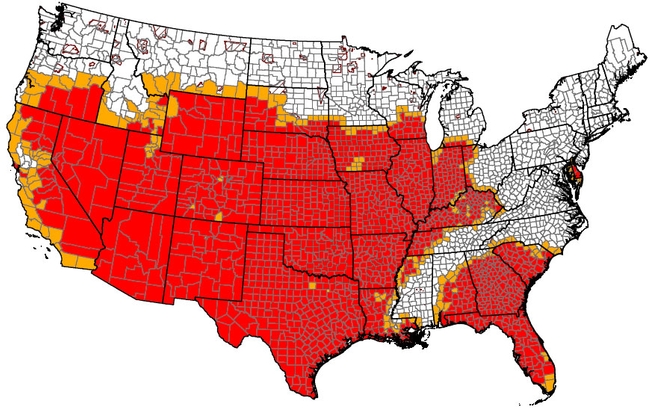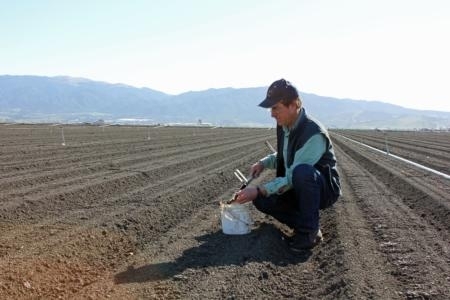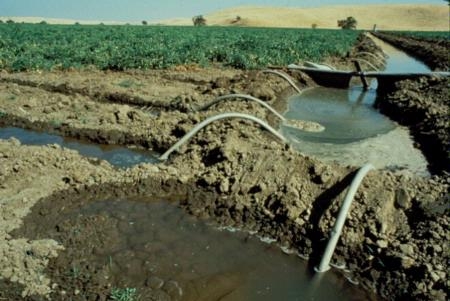Posts Tagged: nitrate
Drought Conditions May Increase the Chances for Risky Levels of Nitrate in Forages
Looking a little dry out there? Dry conditions mean it's good to be cautious about nitrate toxicity in forage crops, particularly small grain...
Nitrate Toxicity Infographic
Some farmers won't suffer due to drought
National Public Radio's Planet Money pointed out that many U.S. farmers who are losing their crops due to drought won't suffer financially because they have government-subsidized crop insurance.
U.S. taxpayers spend about $7 billion a year on crop insurance, the story said.
Daniel Sumner, director of the UC Agricultural Issues Center and professor in the Department of Agriculture and Resource Economics at UC Davis, said he isn't in favor of the government giving farmers subsidies.
Ski resorts suffered last winter when there wasn't a lot of snow. The government doesn't say, "Sorry you didn't have a lot of skiers. Here's a check," Sumner said.
Valley farmers wary of new water rules
Mark Grossi, The Fresno Bee
A UC study released in March says 96 percent of the Central Valley's groundwater contamination problem comes from agriculture, and it threatens the drinking water of 250,000 valley residents. The study suggests better monitoring and management of fertilizers are needed to ease the problem. By using only the amount of fertilizer needed by plants, the nitrates would be controlled. Leaders of water-user groups say farmers already aim for that goal and have become far more efficient. Yet, the state assumes all farmers are discharging to the groundwater, said David Orth, general manager of the Kings River Conservation District and coordinator of a coalition representing farmers in the four-county area. "In other words, everybody is guilty until they prove themselves to be innocent," he said.
Experts: Rinds one reason for salmonella-infected cantaloupe
Scott Kanowsky, WBEZ 91.5
Cantaloupe rinds could be one reason behind a recent salmonella outbreak linked to the fruit. "It's much easier to scrub the surface of a honeydew melon than it is to scrub the surface of a cantaloupe and actually remove microorganisms that are on the surface,” said Linda Harris, UC Cooperative Extension specialist in the Department of Food Science and Technology at UC Davis.
Milk prices going up; nitrate report gets more coverage
A story about USDA milk production forecasts for 2012 and 2013 included commentary from Leslie "Bees" Butler, UC Cooperative Extension specialist in the Department of Agricultural and Resource Economics as UC Davis.
Rising feed prices have caused some producers to sell cows rather than bear the expense of feeding them. Another option is to slaughter cows. Dairies have been doing that a lot -- to the chagrin of glut-wary beef producers -- since 2009 when the all milk price dropped to as low as $11.30 per hundred pounds, the story said.
A strong dollar at the time made foreign goods cheaper and domestically produced goods more expensive, Butler told reporter Courtenay Edelhart. That dried up the export market for American milk and led to oversupply at home that still hasn't been entirely corrected, he said.
Water agency urges farmers to test ground water for contamination
KTVU.com
Landmark new rules adopted by the Central Coast Regional Water Quality Control Board will require farmers to test ground water for nitrate contamination and report their fertilizer usage, according to the KTVU report.
The story mentioned that a recent UC Davis study showed 254,000 people in the Tulare Lake Basin and Salinas Valley were at risk of drinking water contaminated with nitrates, much of which came from fertilizer.
San Joaquin Valley residents learn more about groundwater nitrate problem
Creedon spoke yesterday at a conference arranged by Fresno State's International Center for Water Technology. Also on the panel was Thomas Harter, UC Cooperative Extension specialist in the Department of Land, Air, and Water Resources at UC Davis, who described his recently released research report on nitrates in Tulare Lake Basin and Salinas Valley groundwater.
The conference featured panels and speakers on many of California's water issues, including underground water banking and Southern California's quest for new water sources, Grossi reported. However, no issue was bigger than Harter's study, he said.
Earlier Thursday, Harter and his research team presented details of the report to an audience of about 150 at the UC Kearney Agricultural Research and Extension Center. Two local television stations, ABC affiliate Channel 30 and CBS affiliate Channel 47, provided their viewers with live reports from the scene.
Pump-and-fertilize a potential solution to groundwater nitrate
Pumping up water contaminated with nitrate and using it to fertilize crops is one way the agriculture industry can deal with the groundwater contamination detailed in a UC Davis report released last week, reported Mark Grossi in the Fresno Bee.
By itself, pump-and-fertilize won't be enough, said Thomas Harter, the lead author of the report, Addressing Nitrate in California's Drinking Water. It won't work in areas where there is too much salt in the groundwater, for example. Also, more fresh water must be allowed to seep into the underground aquifer. The fresh water will replace the tainted water and refill underground areas that have been overpumped in the past.
Dare to be different: Think beyond tomatoes, peppers
Laura Christman, Redding Record-Searchlight
When planning a summer garden, try some unusual vegetables, like heat-tolerant greens and odd tubers, the article suggests.
"Most people love tomatoes and a good sweet pepper, but that's not the be-all, end-all of summer nutritional health," said Sean Kriletich, a gardening expert with University of California Cooperative Extension Sierra Central.
Mixing things up in the garden yields different flavors, more nutrition, additional colors, textures and beneficial insects.




